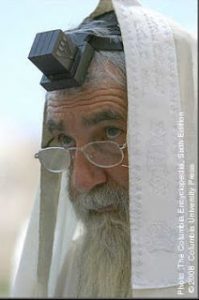If you wish, you can hear the sermon as preached from the UCJ pulpit. Simply click on the start button below.
Delivered at the United Church of Jaffrey
November 5th, 2017
Psalm 107:1-7; 33-37 | Matthew 23:1-12
Earlier this week, when I read the passage from Matthew that you have just heard Sarah read to us, I had one overwhelming question…
What is a phylactery?
Does anyone know?
I asked Mister Google and he gave me this answer:
A phylactery is a “a small leather box containing Hebrew texts on vellum, worn by Jewish men at morning prayer as a reminder to keep the law.”
So a phylactery is kind of liturgical accessory – like a stole, or a cross.
It is something that Jewish men put on when they pray…
That’s all very well, but I still don’t have much of a mental picture of this oddly named item.
Unsatisfied, I did what any good Biblical scholar would do… I performed a Google image search.
That did it.
A phylactery is not just any liturgical accessory… It is a rather imposing item.
Its imposing quality, though, is not a function of its size – it’s not very big.
It looks like it’s about an inch and half square.
The thing that makes a phylactery impressive is where it is worn.
A pious Jewish man who is about to do his morning prayers, straps this phylactery – this little black leather box — to his forehead.
It occupies the same spot on his forehead, as a horn sits on the forehead of a unicorn.
In other words, its conspicuous.
You can’t wear a phylactery without being aware of it at all times, cause its strapped to the front of your face.
And anyone you encounter also cannot avoid seeing it.
It’s also right in front of their face.
This, of course, is intentional.
The point is, the phylactery represents something of extraordinary importance – something so important that it is kept in the most conspicuous spot imaginable – strapped to the forehead.
Broad Phylacteries
But in this passage, that we just heard, Jesus is being rather critical.
Of the scribes and the Pharisees who are in a position of religious authority, Jesus warns his disciples, saying “observe whatever they tell you, but not what they do; for they preach, but do not practice.”
Is this the origin of the familiar saying “practice what you preach?” I think it is!
Jesus condemns these religious leaders. He says that they
“do all their deeds to be seen by men; for they make their phylacteries broad and their fringes long, and they love the place of honor at feasts and the best seats in the synagogues, and salutations in the market places, and being called rabbi by men.”
Did you catch that?
Jesus is not condemning the wearing of phylacteries as such.
He is condemning people who make their phylacteries broad.
What’s wrong with making your phylactery broad?
If the intention of a phylactery is to point its wearer to Jewish Law wouldn’t a broad phylactery be more effective than a narrow one?
Jesus doesn’t think so.
Jesus suggests that the intention of a broad phylactery is not to point to the Jewish law, but to advertise to everyone just how extra pious its wearer is.
The broad phylactery takes the attention away from what is really important, and points it to something that is self-serving.
This is a subtle, but very important distinction.
There is no doubt that a broad phylactery is impressive.
But it points to something that is a distraction.
And in the meantime, the thing that really is important, gets forgotten.
Peculiar Exclamations
As all of you know, I was brought up in a bi-cultural family.
My father was Japanese
And my mother was American.
If that was not confusing enough – when I was a child, we lived in neither Japan or America!
So as I was growing up, I was being actively influenced by a Japanese father, an American mother, and the culture of the nation where we lived.
This cultural mash-up was never so evident as when, for example, we were on family vacation.
Picture this.
We are driving through New Zealand.
My father is driving our old Morris 1100, and my mother is sitting beside him in the passenger seat.
My siblings and I, naturally, are crammed in the backseats.
When we encounter a particularly beautiful vista – which happens at almost every turn, in New Zealand – my Japanese father exclaims:
HaaaaAA!
And my mother, who grew up in the American Midwest, observes the same lovely scene, and goes:
Wheeeee!
Upon which, my siblings and I leave off our bickering, and look out the windows, and say:
Wow!
Why am I telling this amusing story?
I am telling a phylactery story.
The reason for these peculiar exclamations was something truly meaningful – something of astonishing beauty, something of ultimate importance.
Today, when Cary and I and the boys go on family vacation, we do not make the same exclamations.
I have my eyes on the road. Cary and I may talk about this and that, and the boys, in the backseat, are absorbed in their devices.
Devices.
They are undeniably cool.
They are endlessly fascinating to the young mind.
But they are broad phylacteries.
Ultimately, they are distractions.
And what is really important, zips by, outside the car window, unnoticed.
Neglected
ignored.
The Singular Issue of our Time
Have you ever wondered why we are so enamored of virtual reality these days?
Have you ever wondered why young people spend more time in cyber space, than physical space?
Why do people choose to close their curtains and watch YouTube, instead of walking outside in the open air?
Why do we spend endless hours on facebook?
Is it just because these things are cool and fascinating?
It could be.
But could it also be that we choose to be distracted because we don’t want to face reality?
Reality, after all, looks pretty grim.
Just two days ago – on Friday of last week – 13 federal agencies released a Report on the Science of Climate Change.
The conclusions of the report, which disagreed directly with the oft stated beliefs of the president, were dire.
More and more of the predicted impacts of global warming, it says, are now becoming a reality.
Coastal flooding.
Air quality issues.
Extreme heat.
Increased number of hurricanes.
Polar melting.
Wild fires.
Drought.
Disappearing glaciers.
Since the last time this assessment was reported, in 2014, these problems have accelerated faster than scientists expected.
The report states that
stronger evidence has emerged for continuing, rapid, human-caused warming of the global atmosphere and ocean. This report concludes that “it is extremely likely that human influence has been the dominant cause of the observed warming since the mid-20th century. For the warming over the last century, there is no convincing alternative explanation supported by the extent of the observational evidence.”
Dear friends
Climate change is not going to go away if we ignore it.
We are confronted with the singular concern of our time.
The singular problem that faces not only our community, but our species.
This is not merely a political concern.
It is not a partisan issue.
This is not merely a moral concern.
It is not merely a spiritual concern.
We are concerned, here, with survival.
And a question of survival
Must be met with political will
Moral clarity
Spiritual concern.
Prayerful Insistence
People who do not come to church, often get frustrated with Christians who respond by praying.
What good is that?
I want to say this.
If we, in the church, pray, and forget – then we are guilty of the fraud we are being labelled with.
To pray, and feel better about it, is to wear broad phylacteries.
We are saying – look at how pious we are – look at what good people we are…
And we forget what it really important.
That, my brothers and sisters in Christ – is not what our savior would have us do.
Christ would not have us “bind heavy burdens, and lay them on men’s shoulders; while not moving a finger.”
Christ asks us to keep our attention steadily upon that which is important.
Christ asks us to practice what we preach.
That, I believe, is what is meant by being “prayerful.”
To be prayerful, is to live with a keen eye on what is important, not the things that are distractions.
Because while we are fascinated with our broad phylacteries – with our Facebooks, our virtual realities, our cyberspace –
the real thing –
the real world
is dying around us.
This, my friends, is how we can make Christ real in our lives.
By remembering his insistence that we set aside distractions, and keep our prayerful attention on what is real.
No matter how amazing
No matter how cool
No matter how beautiful
Our glittering screens can be,
They can never match the miracle of the good earth
God put us here
Look up
And be filled with wonder!
Amen



